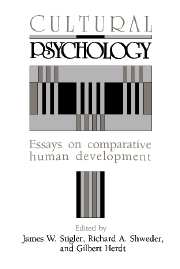Book contents
- Frontmatter
- Contents
- Preface
- Cultural psychology – what is it?
- Part I The keynote address
- Part II Cultural cognition
- Part III Cultural learning
- Part IV Cultural selves
- Part V Cultural conceptions of psychoanalysis
- 13 Stories from Indian psychoanalysis
- 14 The cultural assumptions of psychoanalysis
- 15 Infant environments in psychoanalysis
- Part VI Cultural domination and dominions
- Part VII A skeptical reflection
- List of conference participants
- Name index
- Subject index
13 - Stories from Indian psychoanalysis
Context and text
Published online by Cambridge University Press: 05 June 2012
- Frontmatter
- Contents
- Preface
- Cultural psychology – what is it?
- Part I The keynote address
- Part II Cultural cognition
- Part III Cultural learning
- Part IV Cultural selves
- Part V Cultural conceptions of psychoanalysis
- 13 Stories from Indian psychoanalysis
- 14 The cultural assumptions of psychoanalysis
- 15 Infant environments in psychoanalysis
- Part VI Cultural domination and dominions
- Part VII A skeptical reflection
- List of conference participants
- Name index
- Subject index
Summary
For a richer understanding of the stories from Indian psychoanalysis, they first need to be placed in a framework, provided with a context for their text. This context is itself a story, the story of psychoanalysis in India, which can be fascinating from many points of view.
First, this story holds an epistemological promise in helping us to resolve a perennially vexing issue, namely, the persistent doubt with regard to the universality of psychoanalytic findings. For many contemporary social scientists the question of whether a theory of mental life – originating in the treatment of neurotics from the Viennese Jewish milieu of the early 20th century and confirmed, if that, by scattered case histories of middle-class patients from the Western world – can ignore the cultural relativism of its postulates as resolutely as psychoanalysis has done, is today almost rhetorical. Their suspicion that psychoanalytic theory is limited by its origins has by now hardened into a doubt that refuses to accord validity to psychoanalytic interpretations of non-Western myths, folklore, and rituals as evidence for the transcultural truth of psychoanalysis. What they demand is evidence of a more direct kind from within the non-Western culture itself. An account of clinical practice of psychoanalysis in India, of stories from Third World consulting rooms just might provide this sort of evidence, even when one must admit that such evidence can never be conclusive.
- Type
- Chapter
- Information
- Cultural PsychologyEssays on Comparative Human Development, pp. 427 - 445Publisher: Cambridge University PressPrint publication year: 1990
- 9
- Cited by



